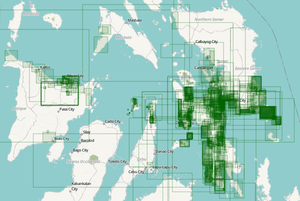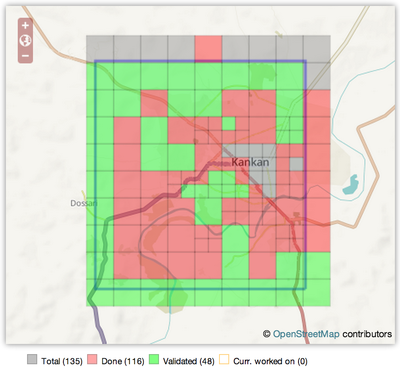2015 Mariana Dam Collapse
| General Information | |
|
The Mariana Dam Collapse happened in 5 November 2015 in the district of Bento Rodrigues, located in Mariana, Minas Gerais, Brazil. The collaborative mapping is at http://tasks.hotosm.org/project/1317 | |
For Aid Organizations
Map and Data Services
About OpenStreetMap
OpenStreetMap offers an online map (and spatial database) which is updated by the minute. Various tools and services allow data extracts for GIS specialists, Routable Garmin GPS data, Smartphone GPS navigation, and other device-compatible downloads. With an internet connection, regular syncing is possible with open access to the community contributed data as it comes in, with OpenStreetMap's bulk data downloads ideal for use offline. In addition, maps can also be printed to paper.
Browse the (example) Activation Area to get a feel for the data that is currently available. Different map styles including an Humanitarian style can be selected on the right side, and some data may not render (appear) on the map, but could be exported from the underlying database (See export section below).
Paper Maps
Poster size Maps and normal sized paper atlases of custom areas can be printed:
- FieldPapers Paper Maps with grid for field survey or general navigation purposes,
- MapOSMatic Large Paper Maps with grid, street index and POI, good for command centers, hospitals, etc.
Exporting OpenStreetMap data
See Downloading data for instructions on getting large scale map data. See Shapefiles if you need this format to export to GIS tools.
- HOT Export Tool: Minas Gerais State, Eastern Brasil: AOI Mining Dam Collapse - Job set-up to export entire HDM dataset for area of interest in various formats.
With the availibility of Small communication devices, Navigation Offline data proves to be very useful to the humanitarians deployed in foreign countries. We support the humanitarian NGO's using navigation data and invite them to give us feedback on the utilization of these devices in the context of field deployment.
- Add additional data sources here...
Usage of OSM data for Humanitarian Missions
- Example CartONG Map
- Please post links/reports here...
About This Humanitarian Mapping Project
About HOT
- To learn more about the Humanitarian OpenStreetMap Team (HOT), explore more of our wiki-pages (root: HOT) or our website hotosm.org. We are a global community of mostly volunteers, we are also a US Nonprofit able to contract with organizations (email info at hotosm.org to contact our staff), we are also a 501-c-3 charitable organization.
History of this Humanitarian Mapping Project
Reactivity of the OSM Community
- HOT community members began supporting the local OpenStreetMap community on November 10, 2015.
Tools, Adaptation and Services
The various OSM developers communicate over internet through various communication channels. In 2013 they implemented the new Humanitarian Map Style, a map more adapted to humanitarian actions. This map, hosted by OpenStreetMap - France, is integrated in various online map tools.
The Tasking Manager and the JOSM editor are essential parts of this Activation. As new imagery are available, new jobs are added to the Tasking Manager. It has allowed HOT to coordinate efforts of mappers around the world. Some days there were more then 200 simultaneous mappers registered on the Task Manager and editing mainly with the JOSM editor. Online editors are also used for less intensive mapping. LearnOSM offers learning material for beginners and more advanced mappers.
For Mappers
How You Can Contribute
Learn to Map
- Most of our volunteer needs are for remote OSM contributors, visit LearnOSM.org to get started.
- Add additional guidance for tagging in the HMP/Activation area here...
Mapping Priority
- Please choose from highest priority first
- Experienced mappers are also asked to participate in validating completed tasks. Information on validating can be found here
| Job No. | Priority | Location | What to map | Imagery Source | Task Mapping Status | Task Validation Status |
|---|---|---|---|---|---|---|
| #1317 | Medium | Bento Rodrigues | post-disaster | Special (see instructions) | In Progress (38%) | In Progress (0%) |
Available Imagery
This Project uses newly acquired post-incident imagery; see the instructions.
How to add to JOSM
It's easy to add special imagery to JOSM from the task manager jobs, where an imagery URL is provided within the task manager. Clicking the URL should trigger JOSM remote control to add the new imagery as a layer. For more details see OSM Tasking Manager/Setting up JOSM
Bing
Bing is the 'default' Imagery available for OSM (default option in most editors). Describe the Bing imagery coverage for the HMP/Activation area, alternative imagery sources may be provided in the Task Manager Jobs, and/or described below.
Potential Datasources
Add potential data sources here...
Edit-a-thon events
- Add your event here...

